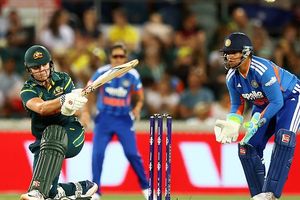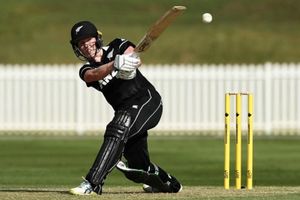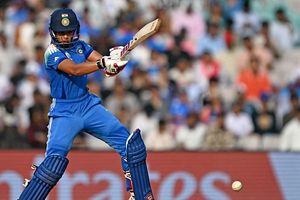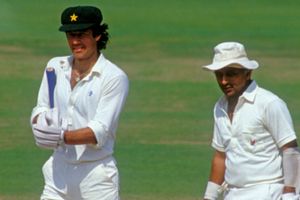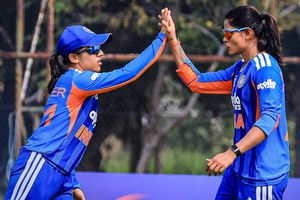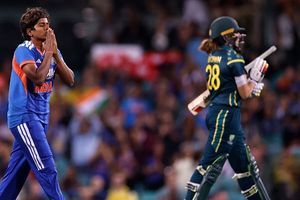South Africa finally got the 'chokers' tag off their chest and won their first ICC title in 27 years after shocking the World no.1 Australia by five wickets in the World Test Championship (WTC) 2023-2025 final at the Lord's on June 14.
While chasing a target of 282, Aiden Markram and Temba Bavuma stood tall and stitched a match-winning 147-run partnership to ensure South Africa go past the finishing line without any hiccups. On Day 4, captain Bavuma delivered a heroic 66-run knock that too in pain which was followed by a historic 136 in South Africa's stunning victory.
The last time South Africa won an ICC title was in 1998 when they clinched the Champions Trophy. South Africa had to bear multiple heartbreaks to final taste glory on June 14 at the famous Lord's ground in London.
The narrative of South Africa's cricketing journey is interwoven with threads of persistent heartbreak in major tournaments. This pattern of near misses manifested itself notably in the 1999 World Cup semifinal against Australia. In a contest that concluded with scores level, it was Australia who progressed to the final due to their superior performance in the preceding stages of the competition. This dramatic episode remains etched in cricketing memory as one of its most agonizing moments.
The elusive taste of victory continued to evade South Africa in subsequent tournaments. The 2015 World Cup witnessed another semifinal exit, this time at the hands of New Zealand in a tense, closely fought encounter. Their struggles extended to the T20 format, culminating in a maiden final appearance in the 2024 T20 World Cup. Hopes were high that their long wait for a major trophy was finally drawing to a close. However, a mere 7-run defeat to India in a nail-biting finish in Barbados prolonged their quest for silverware.
Despite this history of disappointments, South Africa braved all odds and finally got their hands on the coveted ICC title after the wait of 27 years in the form of WTC 2023-2025 title glory.
South Africa orchestrated a remarkable comeback in the World Test Championship Final, successfully chasing down a record target in their showdown against the reigning champions. The momentum began to shift during the second session of Day 3, as Markram and Bavuma forged a resilient partnership on a Lord's pitch that had previously seen a flurry of 28 wickets fall in the first two days. Demonstrating exceptional determination and focus, the duo meticulously accumulated runs, chipping away at the formidable target of 282.
Resuming their innings on Day 4, South Africa required a further 69 runs for victory. Markram and Bavuma continued their steady progress, but the familiar threat of Pat Cummins soon materialized. In the third over of the day, Cummins delivered an outstanding ball that caught the edge of Bavuma's bat, sending it directly into the gloves of the wicketkeeper.
Tristan Stubbs offered further resistance alongside Markram, occupying the crease for 43 deliveries and contributing 8 runs before succumbing to a brilliant delivery from Mitchell Starc. However, Markram, who had remained unbeaten overnight on 102, ensured that he steered South Africa to victory, securing their first-ever ICC title in 27 years.
As the winning runs were scored, the South African players in the dressing room absorbed the significance of the moment, while emotions overflowed in the stands at Lord's with fans shedding tears of joy. Former players, overcome with emotion, celebrated the historic achievement with unrestrained enthusiasm, singing in unison for their national team.
South Africa faced a daunting challenge at the start of Day 3 of the World Test Championship Final. Australia, buoyed by Mitchell Starc's crucial unbeaten half-century (58*), had amassed a total of 207 runs in their second innings, setting South Africa an imposing target of 282. This target was the joint second-highest ever chased at Lord's, a feat last achieved over two decades prior when Nasser Hussain's magnificent century guided England to victory against Stephen Fleming's New Zealand in 2004.
Since that memorable encounter, no team had successfully chased down a target of this magnitude in red-ball cricket. However, the conditions on Day 3 seemed to favor the chasing side as the Lord's wicket flattened out under the sunshine. It was during the second session that Aiden Markram and Temba Bavuma initiated their fightback, offering resistance against the formidable Australian bowling attack.
Bavuma, who was fortunate to be dropped at 2 by Steve Smith, displayed remarkable courage, battling both the hostile Australian fast bowlers and a hamstring injury to keep South Africa's hopes alive. He forged a crucial 143-run partnership for the third wicket alongside Markram, bringing their team within 69 runs of the historic target. As the South African supporters grew increasingly optimistic about a potential victory, former great Dale Steyn cautioned that the remaining runs would be the most challenging of their lives.
Steyn's warning proved accurate when, in the third over of Day 4, Pat Cummins struck a vital blow, dismissing Bavuma with a delivery that edged to the keeper. Despite this setback, Markram remained steadfast at the other end, expertly navigating the unpredictable bounce of the Day 4 pitch. Showing commendable restraint, South Africa resisted the temptation to attack every ball and instead stuck to their game plan, patiently accumulating runs against deliveries pitched wide outside the off stump.
Australia introduced Nathan Lyon into the attack relatively early on Day 4, hoping that the spin-friendly conditions would yield the breakthroughs they desperately needed. Lyon bowled with exceptional control, effectively restricting the flow of runs from his end. The pressure mounted as South Africa struggled to score freely for a period of around thirty minutes. However, Markram skillfully maneuvered through this challenging phase, keeping the scoreboard ticking with singles and doubles in the absence of boundary-scoring opportunities.
Australia also adjusted their fielding positions intelligently. In contrast to Day 3, where fielders were positioned closer to the boundary, they moved them significantly closer to the bat, effectively cutting off several well-struck shots. Lyon employed two close-in fielders on the leg side, creating difficulties for Tristan Stubbs and David Bedingham. While Australia managed to dismiss both Stubbs and Markram in the later stages of the innings, their earlier strategic decisions on Day 3 ultimately proved costly.
Kyle Verreynne ultimately struck the winning runs, sparking jubilant celebrations as South Africa clinched a historic victory in red-ball cricket. This triumph was particularly significant considering their dismal first-innings performance, where they were bowled out for a mere 138 runs, with Markram, their eventual second-innings hero, falling for a duck. Despite head coach Shukri Conrad's pre-match assertions about not carrying past baggage, the first-innings collapse evoked familiar anxieties for South African fans.
The resilient 45-run knock from David Bedingham in the first innings proved crucial in taking South Africa past the 100-run mark against Australia's 212. Kagiso Rabada's exceptional bowling performance in the second innings, where he picked up a five-wicket haul (and nine wickets in the match), also played a vital role in keeping South Africa in contention. Despite Rabada's efforts, Australia seemed to regain the upper hand when Mitchell Starc contributed another valuable innings with the bat. His unbeaten 58 was his eleventh Test fifty, taking his overall Test runs tally to 2,276.
Starc also provided Australia with a glimmer of hope in the final innings by bowling a sensational delivery that dismissed Tristan Stubbs. The perfectly pitched wobble seam ball seamed back sharply, breaching Stubbs' defense and dislodging the leg-stump bail. This breakthrough injected immediate tension into the atmosphere at Lord's, putting significant pressure on the South African batsmen. Runs became increasingly difficult to come by as the Australian fielders displayed incredible athleticism to prevent boundaries, forcing the batsmen to work hard for every run.
However, immense credit must be given to Aiden Markram, who made a conscious decision to avoid attempting expansive shots against both the pace bowlers and Nathan Lyon. Instead, he focused on rotating the strike and nudging the ball into gaps, steadily guiding South Africa closer to the target. It's worth recalling South Africa's similar predicament in the 2024 T20 final against India, where they needed just a run a ball with six wickets in hand but ultimately faltered from a winning position.
Ahead of Day 4, South African fans outside Lord's aptly stated that they would only truly believe in a victory once the target was reached. It seems Markram might have heeded their sentiment. Unlike Heinrich Klaasen's aggressive approach in the 2024 final, Markram remained composed and resolute. Throughout his entire innings, he offered the Australians only one clear run-out opportunity when around fifty runs were still required. As Australia intensified the pressure with a succession of dot balls, Markram's unwavering defense and calculated intent eventually wore them down, leading to errors and a loss of intensity. While Australia deserves credit for their resilience, extending the game for nearly 30 overs on Day 4 while defending a small total of 69 runs, their flawed strategies on Day 3 ultimately led to their downfall.
ADVERTISEMENT

